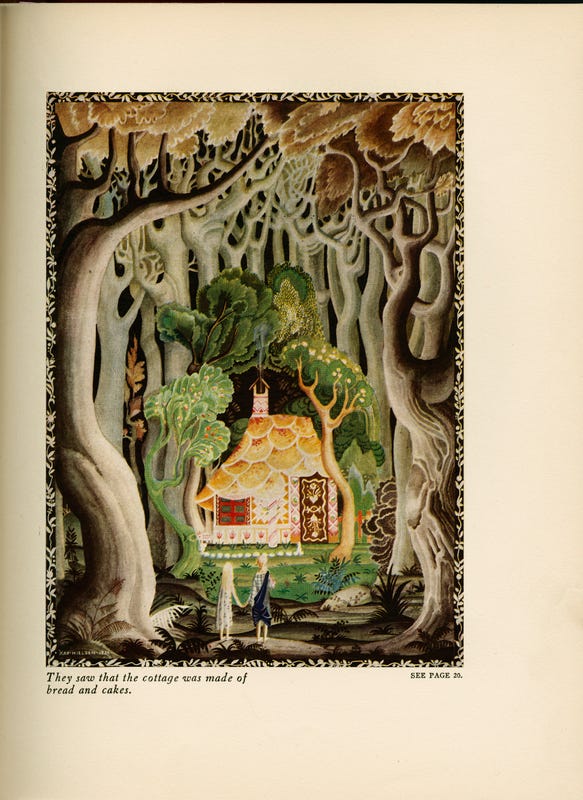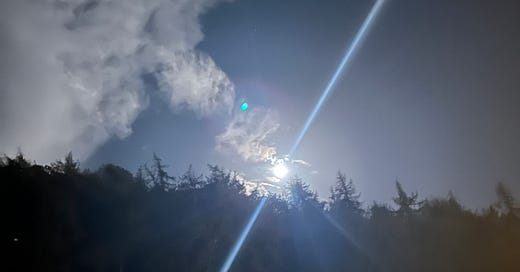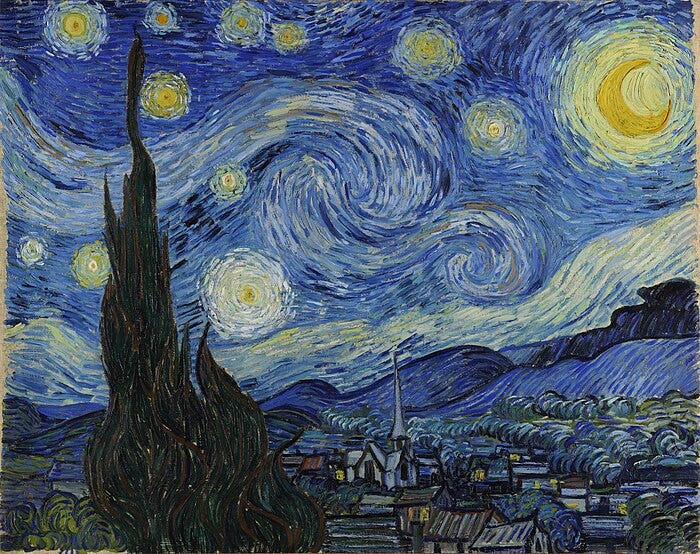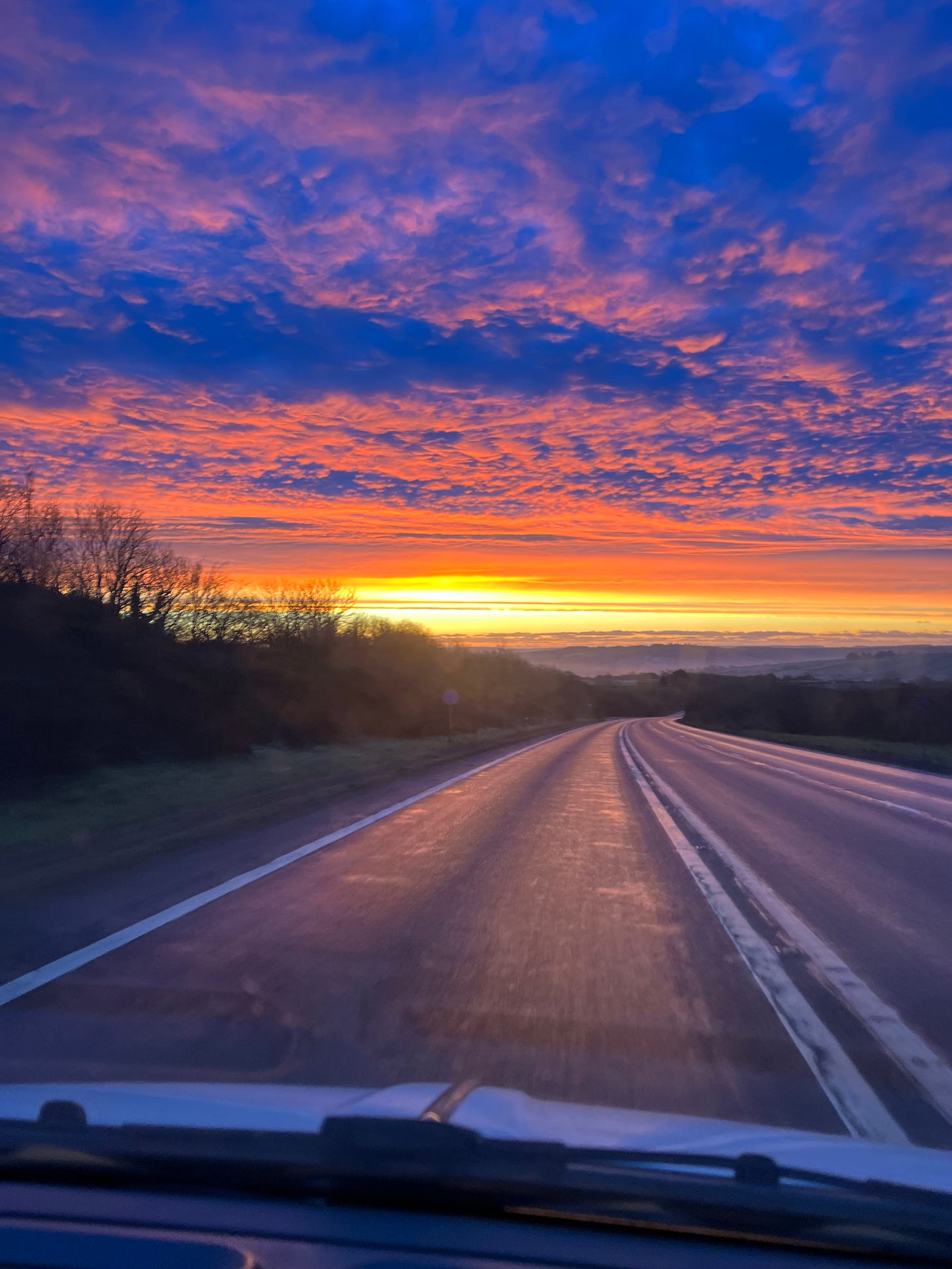“Look at the stars, look how they shine for you”
Coldplay, Charles Taylor, "complete darkness", and true light
My friend and I left the Thai restaurant into dark night, the kind of darkness you only get in deep countryside. The moon, nearly full, glowed regally in a cloudless sky. My local community has just finished celebrating the Dark Skies festival (the national park I live in is a dark skies reserve), and as we walked home down rural lanes, we felt we were getting a taste of the value of true darkness. Dark skies allow us to see the stars, and this reality at the natural level finds a metaphor in the supernatural.
But more of that in a moment.
“Let There be [Controlling of] Light”
When Thomas Edison invented electric light in 1883, for the first time, human beings no longer needed the lights of the heavens to see by. For the first time, we could control our environments and see 24 hours a day. Today, our days and nights are illuminated by the glow of screens. With artificial light, darkness is under our control, it impinges on us only when we choose, often while asleep, and sometimes, not even then.
What dark skies reserves recognise in the natural realm is that deep darkness is needed to see the beauty of night-time, heavenly light.
As we inched our way home down the dark lanes, my friend told me of the magic of being out in the ocean at night, far out of sight of the land, where the starlight is so bright it is almost possible to read by it.
We know, too, that sleeping in complete darkness brings many health benefits.
If this is true of the natural, what about the supernatural realm?
I believe that our souls are disturbed by the light pollution that disturbs our body’s natural sleep patterns and need for total darkness. Our souls, in fact, are more exhausted, overstimulated and suffocated by ‘artificial light’ and technological living even than our bodies.
“Look at the Stars…”
This is where Coldplay comes in… stay with me on this one!
Dozens and dozens of Coldplay lyrics reveal the restless human longing for transcendence and fullness. They capture something of the deep desires of the human spirit.1
Look at the stars
Look how they shine for you
And all the things that you do.
To get philosophical for a moment… The reality of stars shining “for you” cannot be perceived in our disenchanted, flat, and airless 21st-century experience of the universe. In the postmodern experience of life, my existence is as impersonal as artificial, electric light. The universe is anonymous and mechanistic.
Yet, there is something in the human spirit that longs to see beyond what philosopher Charles Taylor2 calls “the immanent frame”, that is, everything created, natural, and of the world, stripped of its enchantment, inert, and incapable of pointing to anything beyond itself. Our spirit longs for transcendence, something beyond.
The longing is so strong that it bursts out in Coldplay lyrics.
We long for the stars to be - not just lifeless, celestial bodies - but connected to us, somehow, in a hierarchy of being. We long for them to have been created by Someone, for them to shine for me.
The scriptures speak of a hierarchical creation where the lights in the sky are set to “govern” (Genesis 1:16, 37:9-10). As the cosmic is stripped from the universe and the divine is eclipsed, all hierarchy is flattened.
The eclipsing of the heavenly is spoken of as punishment in the Bible:
For the stars of the heavens and their constellations will not give their light; the sun will be dark at its rising and the moon will not shed its light.
Isaiah 13:10 (see also Matthew 24:29, Revelation 8:12).
As we humans struggle to “breathe” in a stiflingly immanent universe, we experience this “punishment”. It is what Taylor calls the “malaise” that accompanies the “immanent frame”, which I believe we certainly experience today (hence the evocative resonance of many Coldplay lyrics).
Concealing Darkness from Light

I notice, living in a remote, dark skies reserve village, that darkness impinges on you more in the countryside. I think of small, wooden cottages in fairy tales, vulnerably positioned at the edge of deep, dark forests. Here, the difference between the light and warmth of civilised habitation and the unknown terror of dark wildness is stark.
Artificial light - and now, 24-hour attachment to our smartphones - is symbolic of eliminating this starkness, obscuring the difference between darkness and light. It is symbolic of a philosophical, mindset shift that has taken place, where we cannot be affected by anything - good or bad - outside ourselves. We conceal the reality of good and evil with the deadness of perpetual, electronic illumination: we “buffer” ourselves from all reality.
Taylor writes,
“The buffered self is the agent who no longer fears demons, spirits, magic forces.”
A Secular Age, p. 135
But, to live in the personal universe we all deeply long for, we need to be open (if not completely “porous”) to the transcendent, to the other.
What is the equivalent - for our souls - of the “complete darkness” needed for our bodies?
We won’t perceive the true light of reality without an openness to it. And we won’t have an openness to it without the spiritual equivalent of “complete darkness”. What is this?
First, a caveat: it’s important to say, that God is not limited to nature; he is not phased by our entrapment in the “immanent frame”, in our constant, electronic tethering to artificial light and noise. He can and does break through in any way and at any time he wishes.
But, I also think there’s an equivalent to “complete darkness” that conditions our souls to perceive “true light”.
Spiritually turning off artificial light means detoxing from everything that dulls us from reality, that obscures darkness from light. Just as we digitally detox, I believe that spiritual health comes from the “complete darkness” (from time to time) of solitude, silence, rest, nature, contemplation, community of real relationships, fasting. All of these cause in us something akin to “porousness” of self, openness to be affected by spiritual reality outside ourselves.
Only then do we experience the exuberance of stars shining “for me”, the reality of an enchanted universe, one where everything that exists points beyond itself. We experience the bubbling joy of a universe with a “personal”, Trinitarian foundation, not an anonymous, mechanistic one.

A local friend phoned me recently to say she’d been at the coast that day beneath the full moon of the autumn equinox. The power of the waves crashing across the harbour wall had taken her breath away.
Greater than the roar of mighty waters
more glorious than the surgings of the sea,
the Lord is glorious on high.Psalm 93
We need eyes to see the created realm pointing us to cosmic realities. Purifying our senses of all the noise and light pollution of distraction and sensationalism, allows God to pierce through the immanent frame. It allows shafts of divine light to penetrate our souls, suffocated of the oxygen of relationship with him.
Human beings need to know with certainty in their hearts that, indeed, “the stars shine for you”, and that the One who made it all, made and loves you.
As a long-time Coldplay fan, one of my hoped-for “when-I’m-retired” projects is to sift their lyrics for such references… 🤓
If you follow these newsletters for even a short time, you’ll soon realise I am a Charles Taylor ‘fan-girl’ and recommend A Secular Age to just about anyone with whom I end up discussing anything remotely philosophical…








What a beautiful post! My favorite you've written so far!
Hannah, I love this! It is so so true and the longing is practically palpable. I’m reading a book at the moment set in colonial Massachussets where often the wilderness represents and reflects the lurking forces of evil. It’s been strange for me to try and wrap my head around this concept, given how nature has always been a respite, a breath, that pause or space for so many of us. I think, though, that there is a contrast to be made between the nature we have explored and in so many ways tamed and the wilderness portrayed in the novel. I haven’t quite untangled all the meaning there is there but this article, beautifully written, has turned my thoughts back to it with renewed interest. Thank you!